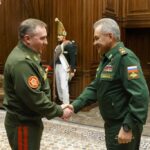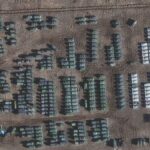On November 26, Azerbaijani President Ilham Aliyev, Armenian Prime Minister Nikol Pashinyan, and Russian President Vladimir Putin gathered for a summit in the city of Sochi, Russia. The summit was the second meeting between the Armenian and Azerbaijani leaders since the end of the 44-day Karabakh War in November 2020. Initially, the gathering, as announced by the Russian President’s Press-Secretary Dmitri Peskov, was planned to be held on November 9 to mark the first anniversary of the signing of the November trilateral agreement, which fixed the devastating defeat of Armenia in the war, but the summit’s date was later changed.
The summit started with a bilateral meeting between Putin and Aliyev, even though Pashinyan had arrived in Sochi earlier than his Azerbaijani counterpart. Putin then hosted a trilateral meeting that lasted more than three hours, concluding with the leaders signing a special statement. The summit concluded with a bilateral meeting between Putin and Pashinyan and a meeting between President Putin and the permanent members of the Russian Security Council.
The Sochi summit was preceded by rising tensions and heavy fighting between Baku and Yerevan, and as expected, its focus included major issues of the post-war agenda, notably the unblocking of regional transportation and communication channels and the delimitation and demarcation of the Armenia-Azerbaijan state borders.
Praising Russia’s role in regulating the conflict and the reconciliation process, both leaders expressed their interests in establishing sustainable peace. Aliyev said that Azerbaijan had offered a ‘peace agreement’ to Armenia, including the mutual recognition of territorial integrity, which it had refused to accept. Armenian Prime Minister Nikol Pashinyan, on the other hand, stated that the situation between Armenia and Azerbaijan was not “as good as they would like it to be” and expressed his dissatisfaction with Azerbaijan still holding Armenian prisoners of war and allegedly having troops stationed on Armenian territory.
Despite that, the two sides did not sign any official agreements regarding the delimitation and demarcation of the borders or on new transportation corridors connecting Azerbaijan’s with its exclave of Nakhchivan via Armenia. Even though both issues are reflected in the Moscow-brokered ceasefire agreement, Armenia and Azerbaijan have been interpreting them in different ways. The “interpretation problem” has not deterred but instead has contributed to occasionally rising tensions between the two sides.
Instead of an additional agreement, Aliyev and Pashinyan merely signed a one-page document in which they pledged to commit to “taking steps to increase the level of stability and security on the Azerbaijani-Armenian border.” In the document, the three sides expressed their intention “to work towards the creation of a bilateral commission on the delimitation of the state border” between Armenia and Azerbaijan “with its subsequent demarcation with the consultative assistance of the Russian Federation at the request of the parties.” They also pledged “to intensify joint efforts aimed at the earliest possible resolution” to establish economic and transport connections in the region. According to Putin, the commission would be established before the end of the year.
The document signed in Sochi is an important step forward in the relations between Yerevan and Baku as they have recognized interstate borders and agreed to peacefully resolve the ongoing disputes, a factor that has largely undermined post-war peace and reconciliation processes. Hence, the agreement between Pashinyan and Aliyev has the potential to eventually help settle the border disputes between the two countries and prevent armed escalations that have plagued both sides since the ceasefire agreement.
Some agreements reached between the two sides have not been stated in the joint statement and will be summarized by the deputy prime ministers under the Armenian-Azerbaijani-Russian trilateral working group. The group, which was formed at the beginning of this year and gathered the deputy prime ministers from each country, has been actively meeting since its establishment and has been working on action plans for regional transportation links, including the Zangezur corridor.
Additionally, during the summit, the Armenian side did not raise the issue of Nagorno-Karabakh’s future status as it previously insisted on. On November 23, the Armenian Prime Minister even stated that ‘Karabakh’ had nothing to do “with the territory” and was “a matter of law” underlining that Armenia had recognized Azerbaijan’s territorial integrity “under the documents of the Commonwealth of Independent States (CIS) in 1991.”
While Pashinyan’s statement somewhat contrasted Armenia’s previous rhetoric for “remedial secession” of “Artsakh” (Armenian name for Nagorno-Karabakh), the outcome of the Sochi summit seems to have been a constructive step in the post-war peace process between the Baku and Yerevan. Pashinyan’s apparently divergent stance and the adopted statement demonstrate the potential for peace and reconciliation between Armenia and Azerbaijan, a concept that has often come under question in light of disputes that have emerged since the signing of the trilateral agreement ending the 2020 war.
Image source: kremlin.ru

